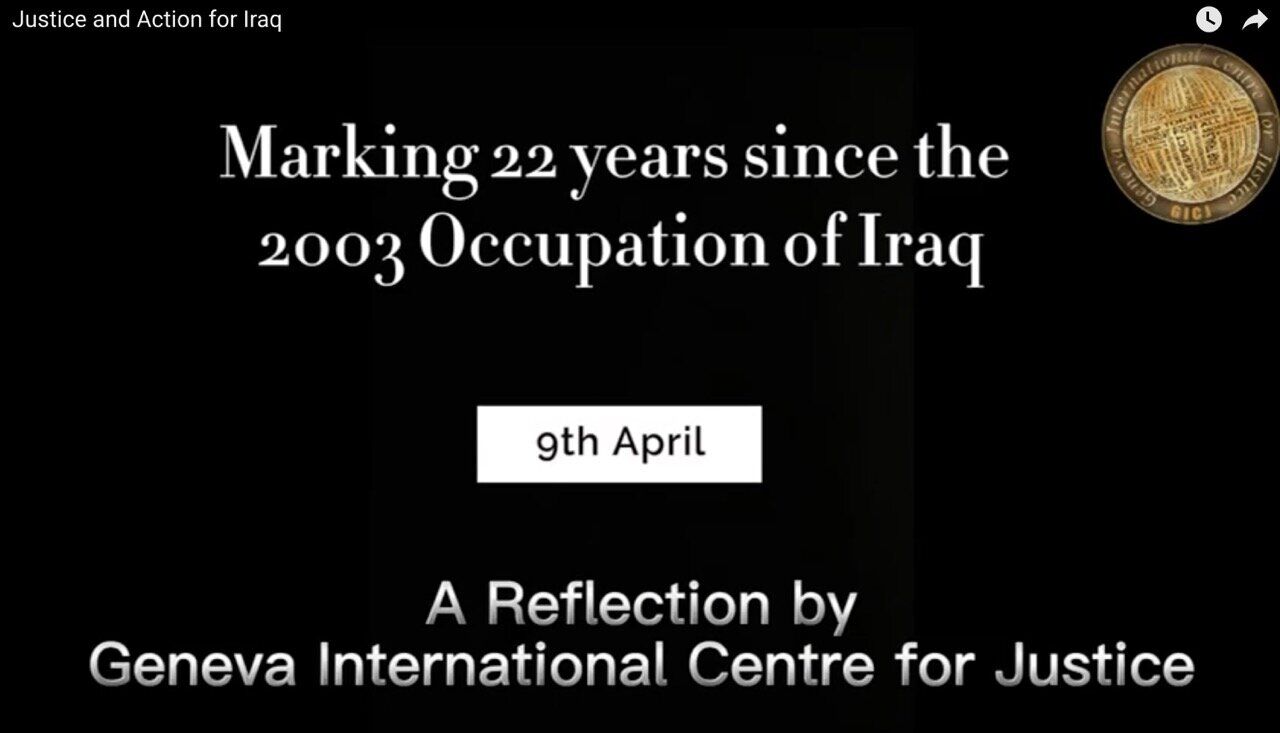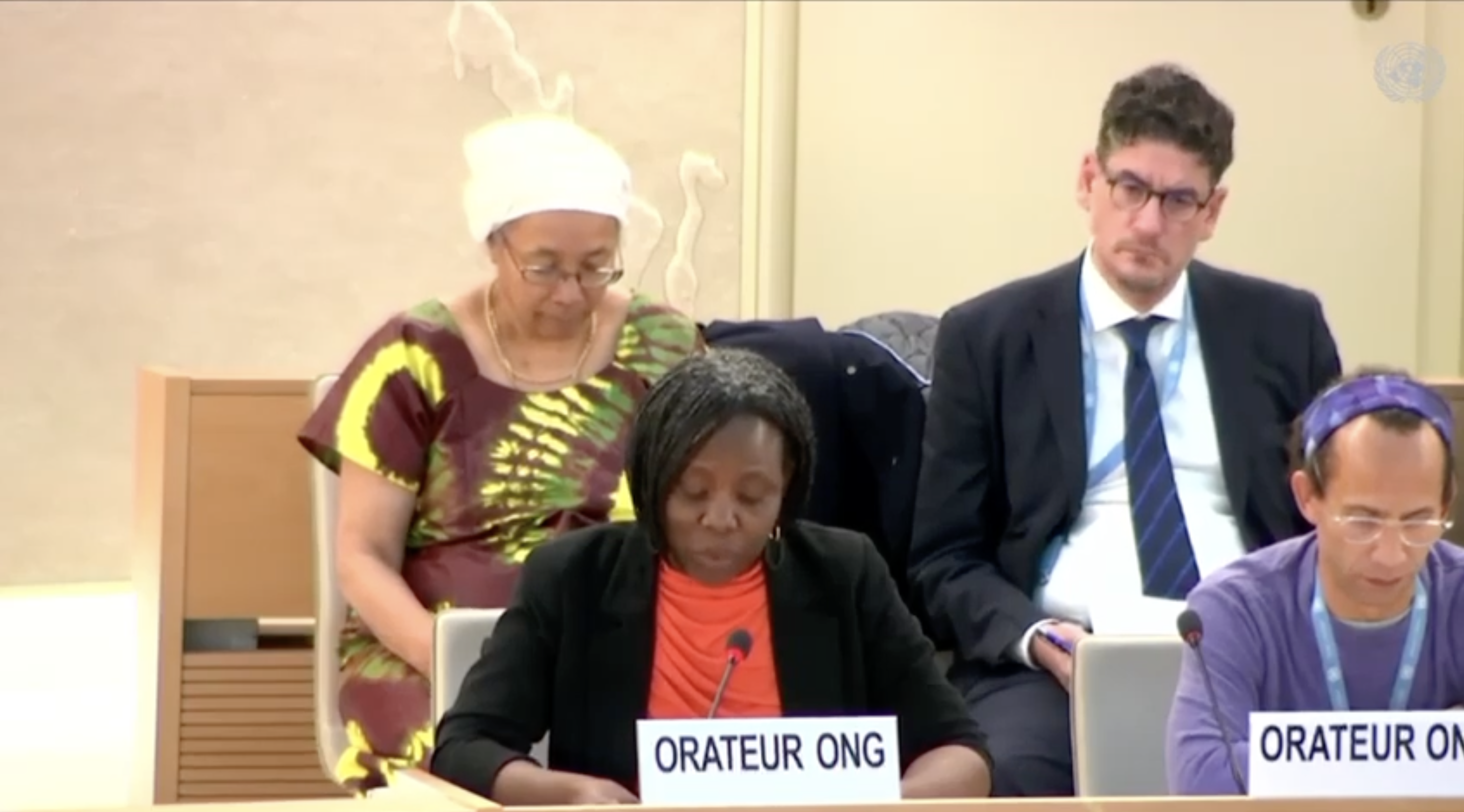International Women’s Day Special:
Palestinian Women’s Rights Under Siege

By Héloïse Carel / GICJ
On International’s Women’s Day (IWD), one can only think of the plight of Palestinian women, and the increased violence they currently face at the hands of Israeli aggression.
IWD arose out of the struggle for women’s rights and women’s liberation in the early 20th century, and it is now more important than ever that we remember that the fight is far from over. Despite progress, the rights of women everywhere are at risk of being violated, assuming they have not been already. Palestinian women have been profoundly impacted by the Israeli attack on Gaza and the ongoing 56-year occupation. Palestinian women in the West Bank also see their rights routinely violated amid rising Israeli violence across the occupied territory. In the ongoing catastrophe in Gaza, Palestinian women find themselves in a uniquely vulnerable position, facing widespread violations of their rights. As the world celebrates International Women’s Day on 8 March 2024, more than 9,000 women have been killed by Israeli forces since 7 October. However, the true toll is unknown, as many more have been missing under the rubble of bombed buildings since the genocide began. Women are disproportionately affected by displacement, food scarcity, and gender-based violence. With reports of arbitrary detention, sexual violence, and limited access to essential resources like food and healthcare, they bear the brunt of the conflict's impact. They are also often the ones left to care for the hundreds of thousands of Palestinian children who have been traumatised by the assault, who represent over half of the territory’s population. Palestinian women’s rights to safety, dignity, and healthcare have been repeatedly violated, highlighting the urgent need for international attention and action to protect them during this crisis.
The devastating impact of the genocide on women in Gaza
In Gaza, the impact of Israel's actions has been particularly horrific for Palestinian women. Since the beginning of the war, Palestinian women and girls have been targeted by Israeli forces, even while seeking refuge. Shockingly, some of these women were reportedly killed by the Israeli Occupation Forces (IOF) despite holding white pieces of cloth - a symbol of surrender and peaceful intent. Furthermore, Palestinian women have endured dehumanising treatment at the hands of Israeli forces, illustrated by reports of women detained in Gaza being confined to cages in harsh weather conditions. Before the war, women and girls accounted for less than 14% of casualties in Gaza. However, this proportion has skyrocketed to 70% during the current genocide, highlighting the disproportionate impact on women and children. The deaths of so many women has had a devastating effect on the fabric of Gazan society, with an average of 37 mothers tragically losing their lives each day. This leaves families shattered and their children vulnerable and lacking adequate protection.
Amid Israel's ongoing military campaign in Gaza, reports of disappearances, and arbitrary detentions have risen extensively. Disturbing reports have emerged indicating that Palestinian women and girls have disappeared following interactions with the Israeli army in Gaza. Particularly alarming accounts such as the forced transfer of at least one female infant into Israel have surfaced. Further compounding the suffering of civilians, Israeli strikes on telecommunications infrastructure have resulted in an Internet shutdown in Gaza, leaving Gazans isolated and unable to communicate. According to investigations conducted in late December, at least 200 women and children had been detained by Israeli forces since the onset of the deadly military operation.
In the harrowing landscape of Gaza, women find themselves uniquely vulnerable, grappling with the compounded burdens of displacement and the gendered fallout of warfare. Among the 1.9 million forcibly displaced individuals, nearly a million are women and girls, who are facing gender-specific challenges. Tragically, the conflict has left thousands of women widowed and thrust into the role of being the sole household provider. The escalation of violence has seen a surge in the number of women-headed households, now shouldering the immense responsibility of securing food, shelter, and protection of their loved ones. Compounded by structural gender discrimination and legal frameworks assuming women's subordination to men, the plight of women in Gaza is further exacerbated. Overcrowded shelters offer scant privacy, exposing women and girls to heightened risks of exploitation and abuse. As resources dwindle and livelihoods are shattered, the spectre of early marriage looms ominously, particularly for vulnerable young girls bereft of parental support. Urgent action is imperative to address the distinct needs and vulnerabilities of women and girls in Gaza, ensuring access to essential services and safeguarding against the scourge of gender-based violence that threatens to further compound their suffering amidst the chaos of conflict.
The gendered impact of the genocide and humanitarian crisis in Gaza
As highlighted by Reem Alsalem, while the war has affected both men and women, women have disproportionately been affected by the war on Gaza. In fact, the current war has been referred to by the UN as a “war on women.”
Rates of gender-based sexual violence continue to rise
As part of the detention processes orchestrated by Israel, there has been a rise in sexual violence perpetrated against Palestinian women throughout the Occupied Palestinian Territory, raising concern within the international community.
The data from Gaza presents a deeply troubling picture of sexual violence perpetrated against Palestinian women and girls by State and Non-State Actors since 7 October 2023. Particularly distressing are reports of sexual assault within detention facilities, where Palestinian women and girls have allegedly been subjected to multiple forms of abuse, including being stripped naked and searched by male Israeli army officers. Moreover, at least two female Palestinian detainees were reportedly raped, while others have endured threats of sexual violence. Furthermore, it is reported that photos of these women in degrading circumstances were taken by the Israeli army and disseminated online, exacerbating their humiliation and trauma.
Sexual violence against Palestinian women is escalating, extending its reach beyond Gaza into the West Bank. Despite it being prevalent before the events of 7 October, disturbing reports reveal an increase in mistreatment of female Palestinians in detention. Instances of disproportionate physical and sexual violence, including sexual harassment and threats of rape during house raids and at checkpoints, have been documented. Since the beginning of the genocide, 6,500 Palestinians, including numerous women, have been arrested in the West Bank and East Jerusalem. These arrests are often characterised by brutal tactics, such as stripping detainees naked, blindfolding them, and subjecting them to prolonged periods of restraint and humiliation. Reem Alsalem, Special Rapporteur on violence against women and girls, its causes and consequences, and Francesca Albanese, Special Rapporteur on the situation of human rights in the Palestinian territories have called for an urgent and thorough investigation into these allegations emphasising Israel's obligation to uphold the rights and dignity of Palestinian women and girls. They warn that these egregious acts may constitute grave violations of international human rights and humanitarian law, potentially amounting to serious crimes under international criminal law. These findings underscore the urgent need for accountability and justice to ensure the safety and well-being of Palestinian women and girls in Gaza. News reports have shown images shared by IOF soldiers online, posing with Palestinian women’s intimate garments, accompanied by misogynistic slurs. This illustrates the deeply ingrained racist and sexist mentalities that lead to the dehumanisation of Palestinians.
Reproductive healthcare is severely at risk
The displacement of Palestinian women and girls has exacerbated their already vulnerable situation, stripping them of privacy, dignity, and access to essential care and products. Over 690,000 menstruating women and girls face limited access to menstrual hygiene products, compounding their challenges of displacement. Arbitrary detention further compounds their suffering, with many detainees, including human rights defenders and journalists, reportedly denied basic necessities such as menstruation pads. As the crisis deepens, the urgency of addressing women and girls' specific needs becomes increasingly apparent. Israel has been called to ensure the provision of essential supplies and services to all civilians, with a special focus on women and girls’ needs. This includes access to reproductive health services, sanitary products, safe and dignified shelter. Without immediate intervention, the health of women and girls in Gaza hangs precariously in the balance, severely compromised by the ongoing humanitarian crisis.
Amidst acute food insecurity and dwindling resources, pregnant women face heightened health risks, exacerbated by limited access to essential nutrition and medical care. With half of Gaza's hospitals non-operational, expectant mothers endure the terrifying prospect of childbirth in precarious conditions devoid of basic medical supplies and facilities. Gender-specific services, already strained by the conflict, are further disrupted, leaving an estimated 50,000 pregnant women, particularly vulnerable. Reports indicate that an alarming number of women are forced to give birth without anaesthesia or surgical intervention, exposing them and their newborns to grave risks. The only functioning maternity hospital in northern Gaza teeters on the brink of collapse. Due to the lack of medicines and medical tools throughout Gaza, some women have been forced to undergo hysterectomies after giving birth in order to avoid further complications. This critical shortage jeopardises the safety and right to adequate healthcare of the 5,500 women projected to give birth in the next month alone, and poses a grave risk to their lives.
The relentless assault on the reproductive rights of Palestinian women and their newborns by Israeli forces has drawn condemnation from human rights experts. The deliberate targeting of Gaza's health infrastructure, resulting in the closure of hospitals and primary healthcare centers, constitutes a grave violation of the right to life and may amount to acts of genocide under international law. With each passing day, the plight of pregnant women in Gaza grows increasingly dire, underscoring the urgent need for international intervention to ensure their access to essential maternal healthcare and safeguard their fundamental rights amidst the horrors of conflict.
Food scarcity compounds the obstacles Palestinian women face
Access to food, water, and sanitation facilities remains limited, particularly impacting lactating women, and young girls. Safe and gender-segregated facilities, access to healthcare, and essential items are urgently required to preserve their dignity and well-being amidst the hardships of displacement.
Moreover, food scarcity in Gaza has reached unprecedented levels, touching women more widely. As access to food diminishes, women tend to prioritise the nutritional needs of their families over their own, often sacrificing their own meals to ensure their children are fed. Pregnant and lactating women face even greater risks of malnutrition, posing serious health concerns for both themselves and their babies. Four in five women indicated that their families now consume only half or less of the food they did before the conflict, and that at least one of their family members had to skip meals during the past week. In around 95% of those cases, mothers are the ones depriving themselves from eating.
Female-headed households encounter additional obstacles when attempting to access food distribution points. As food insecurity reaches critical levels, women are finding it increasingly difficult to access food compared to men, leading some to resort to extreme measures such as scavenging for food in rubble or dumpsters. With Gaza's entire population on the brink of starvation, urgent action is needed to address this humanitarian crisis and ensure that women and girls receive the necessary support to access adequate nutrition and sustain their families.
Geneva International Centre for Justice (GICJ) urges Israel to cease its relentless assault on Gaza, and to adhere to international humanitarian and human rights laws. We call on Israel to comply with the International Court of Justice's orders and put an end to the violence it has inflicted on the Palestinian people, including its disproportionate effect on Palestinian women. GICJ emphasises the need for accountability for gender-based violence and stresses that women should not bear the costs of the assault. The occupation must end, and a ceasefire is necessary now.







